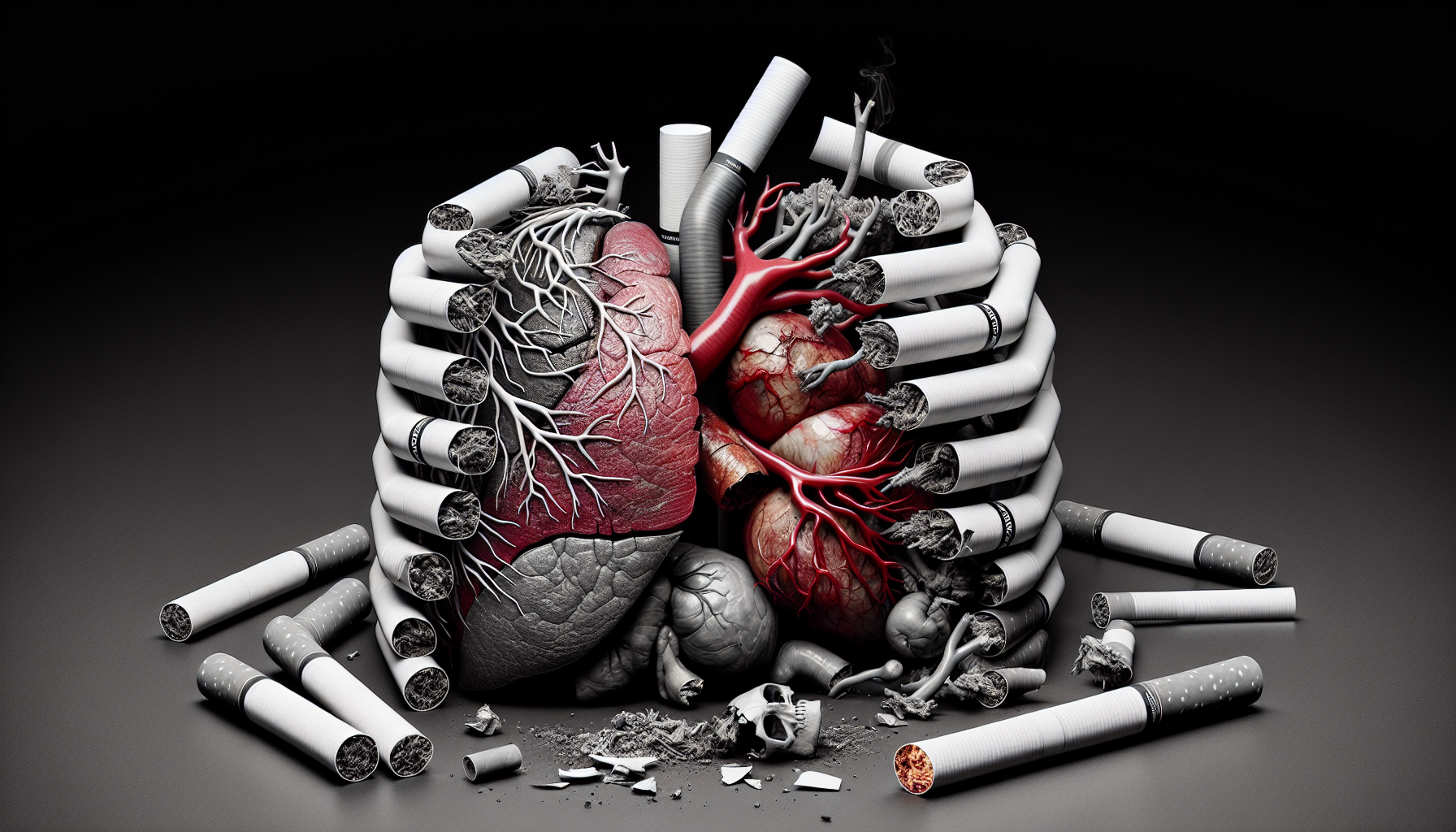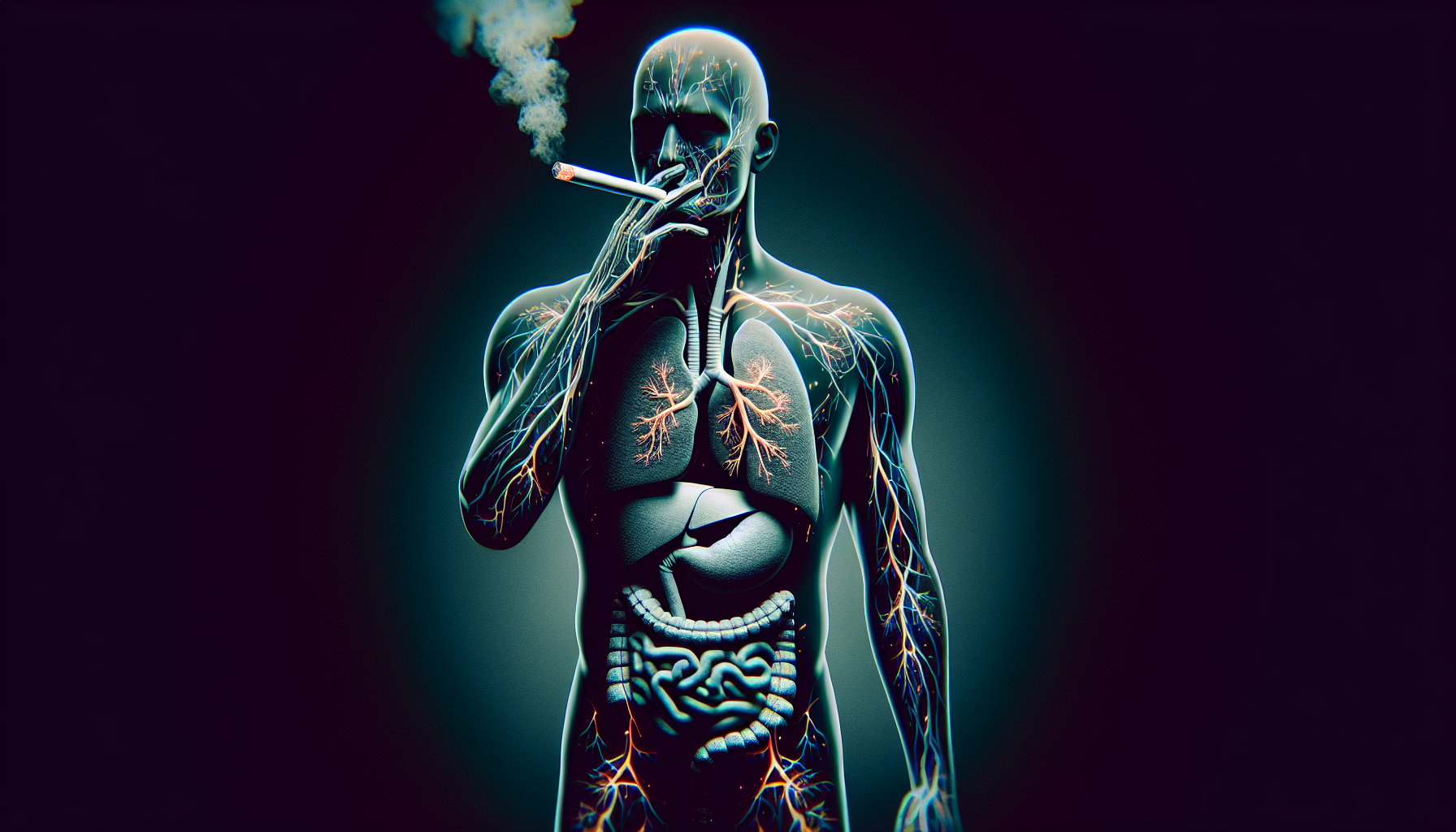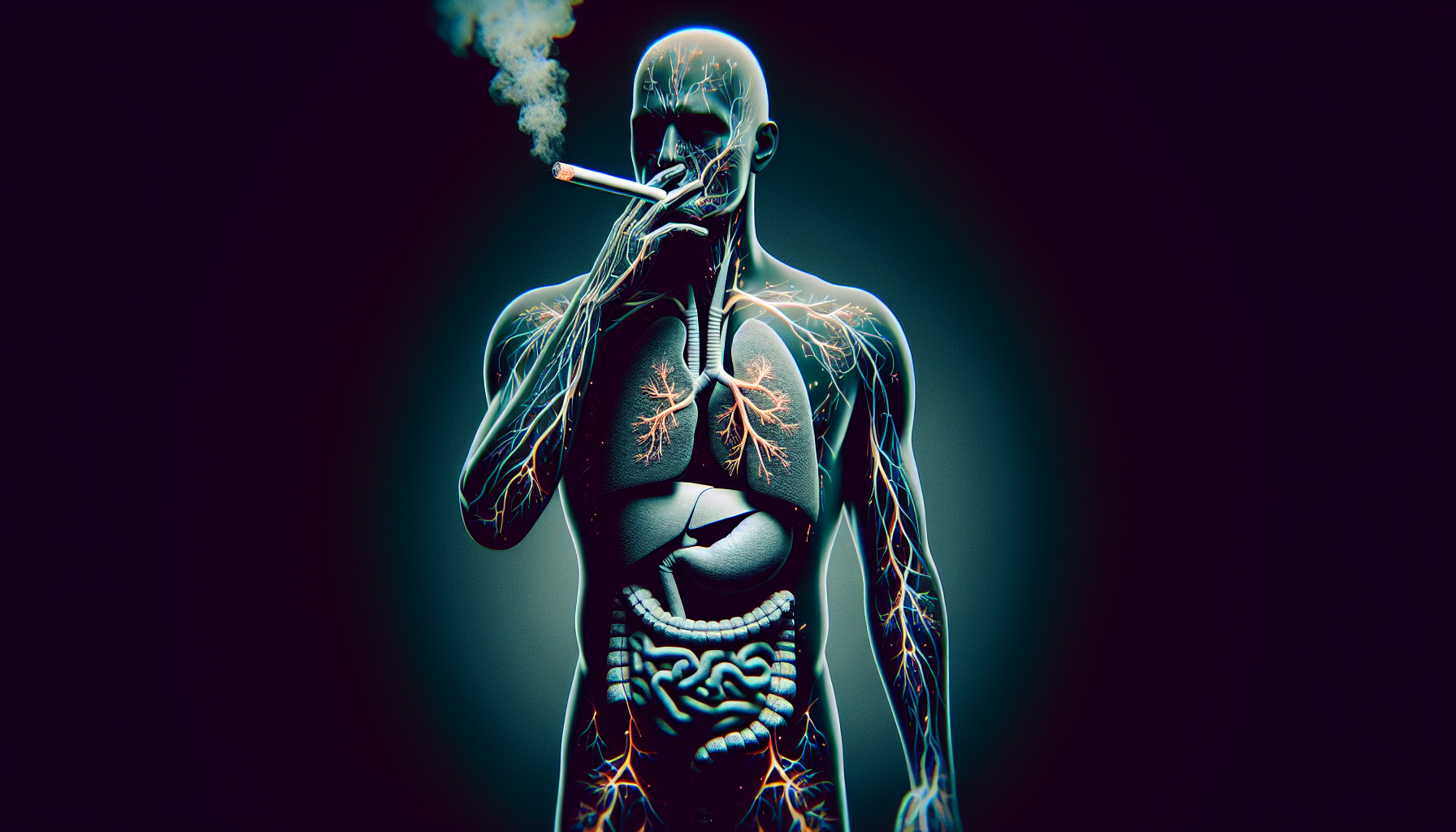Smoking is a harmful habit that can have devastating consequences not just for the smoker, but also for those around them. The effects of smoking extend far beyond stained teeth and bad breath, with a multitude of health problems arising from this addictive behavior. From respiratory issues such as chronic bronchitis and asthma, to more serious conditions like lung cancer and heart disease, smoking poses a significant threat to your overall well-being. In this article, we will explore the various health problems caused by smoking and shed light on the importance of quitting this detrimental habit.
Respiratory Problems
Chronic Obstructive Pulmonary Disease (COPD)
Smoking is a major cause of chronic obstructive pulmonary disease (COPD), a progressive lung disease that includes chronic bronchitis and emphysema. When you smoke, the harmful chemicals from tobacco smoke irritate and inflame the airways, leading to chronic bronchitis. This condition is characterized by a persistent cough, excessive mucus production, and difficulty breathing. Emphysema, on the other hand, destroys the air sacs in your lungs, making it harder for oxygen to reach your bloodstream. COPD is not curable and can significantly impact your quality of life.
Lung Cancer
One of the most well-known health risks of smoking is lung cancer. Cigarette smoke contains numerous carcinogens that damage the cells in your lungs, leading to the development of cancerous tumors. Lung cancer can be deadly and is responsible for a significant number of cancer-related deaths worldwide. Even if you have quit smoking, your risk of developing lung cancer remains elevated compared to those who have never smoked. Quitting smoking substantially reduces your chances of developing this deadly disease.
Bronchitis
Bronchitis is another respiratory problem commonly caused by smoking. It is characterized by the inflammation and narrowing of the airways in your lungs, leading to excessive mucus production and coughing. Smoking damages the cilia, tiny hair-like structures in your airways that help move mucus out of your lungs, impairing their ability to function properly. As a result, bacteria and viruses can further infect your already compromised airways, leading to the development of bronchitis. Quitting smoking is crucial in managing and preventing this condition.
Emphysema
Emphysema is a type of chronic obstructive pulmonary disease that causes irreversible damage to the air sacs in your lungs. Smoking is the primary cause of emphysema as the toxic chemicals in cigarette smoke destroy the elastic fibers that support the air sacs, leading to their permanent enlargement and collapse. This makes it difficult for your lungs to efficiently exchange oxygen and carbon dioxide during breathing. Emphysema is a progressive disease that worsens over time and can severely impact your ability to breathe.
Asthma
Smoking is known to significantly worsen asthma symptoms in people who already have the condition. When you have asthma, your airways become inflamed and narrowed, making it difficult to breathe. Smoking further aggravates this inflammation, leading to more frequent and severe asthma attacks. Additionally, exposure to secondhand smoke can also trigger asthma symptoms in individuals, especially children. Quitting smoking is essential for both managing asthma and preventing its onset in non-smokers.
Cardiovascular Issues
Coronary Heart Disease
Smoking is a major risk factor for coronary heart disease, a condition where the arteries that supply oxygen-rich blood to the heart become narrow or blocked. The chemicals in cigarette smoke can damage the lining of your blood vessels, causing fatty deposits (plaques) to build up and restrict blood flow to the heart. This can lead to chest pain (angina), heart attacks, and other serious heart-related conditions. Quitting smoking is crucial in reducing the risk of developing coronary heart disease and improving overall cardiovascular health.
Stroke
Smoking significantly increases your risk of having a stroke. Stroke occurs when the blood supply to the brain is interrupted, either by a blood clot or the rupture of a blood vessel. Smoking damages blood vessels and makes your blood more prone to clotting, increasing the likelihood of a stroke. Furthermore, it also reduces the amount of oxygen in your blood, which can further contribute to the development of a stroke. Quitting smoking is essential in reducing the risk of stroke and improving overall brain health.
Peripheral Artery Disease (PAD)
Smoking is a significant risk factor for peripheral artery disease (PAD), which is characterized by the narrowing of blood vessels that supply blood to the legs and arms. The toxic chemicals in cigarette smoke damage the lining of these blood vessels, leading to the buildup of plaques and reduced blood flow to the affected areas. PAD can cause pain, numbness, and difficulty walking. In severe cases, it can lead to tissue death and the need for amputation. Quitting smoking is vital in managing PAD and preventing its progression.
Atherosclerosis
Atherosclerosis is a condition where fatty deposits (plaques) build up in the arteries, narrowing them and restricting blood flow. Smoking is a significant risk factor for the development and progression of atherosclerosis. The chemicals in cigarette smoke damage the lining of blood vessels, making them more susceptible to plaque formation. Over time, these plaques can rupture, leading to blood clots that can block blood flow to vital organs like the heart or brain. Quitting smoking is essential in reducing the risk of atherosclerosis and its associated complications.
Heart Attack
Smoking is a leading cause of heart attacks. When you smoke, the toxic chemicals in cigarette smoke damage the lining of your blood vessels, causing the formation of plaques that can rupture and block blood flow to the heart. This restriction of blood flow can lead to a heart attack, which occurs when a part of the heart muscle is deprived of oxygen. The damage caused by a heart attack can be life-threatening and may result in long-term heart complications. Quitting smoking is crucial in preventing heart attacks and improving overall heart health.

Cancer
Lung Cancer
Smoking is by far the leading cause of lung cancer. The harmful chemicals in cigarette smoke damage the cells in your lungs, leading to the development of cancerous tumors. Lung cancer is often diagnosed at an advanced stage, making it difficult to treat and resulting in poor survival rates. Even if you have quit smoking, your risk of developing lung cancer remains elevated compared to those who have never smoked. Quitting smoking is vital in reducing the risk of lung cancer and improving overall lung health.
Throat Cancer
Smoking is a major risk factor for throat cancer, which includes cancers of the larynx (voice box) and pharynx (the tube that connects the nose and mouth to the esophagus). When you smoke, the harmful chemicals in cigarette smoke come into contact with the cells lining your throat, leading to genetic changes that can result in the development of cancer. Quitting smoking significantly reduces the risk of developing throat cancer and improves overall throat health.
Esophageal Cancer
Smoking is a known cause of esophageal cancer, a type of cancer that occurs in the esophagus, the tube that carries food and liquid from your throat to your stomach. The harmful chemicals in cigarette smoke can irritate the cells lining the esophagus, leading to DNA damage and the formation of cancer. Quitting smoking plays a crucial role in reducing the risk of esophageal cancer and improving overall esophageal health.
Oral Cancer
Smoking is a significant risk factor for oral cancer, which includes cancers of the lips, tongue, cheeks, and throat. The chemicals in cigarette smoke can damage the cells in your mouth and throat, leading to the development of cancerous tumors. Oral cancer can be aggressive and often detected at later stages, making it more challenging to treat. Quitting smoking is vital in reducing the risk of oral cancer and improving overall oral health.
Pancreatic Cancer
Smoking is a well-established risk factor for pancreatic cancer, one of the deadliest forms of cancer with a low survival rate. The toxic chemicals in cigarette smoke can damage the DNA in your pancreatic cells, leading to the formation of cancerous tumors. Pancreatic cancer is often diagnosed at an advanced stage due to the lack of early symptoms, making it difficult to treat effectively. Quitting smoking is vital in reducing the risk of pancreatic cancer and improving overall pancreatic health.
Gastrointestinal Disorders
Peptic Ulcer Disease
Smoking is a contributing factor to peptic ulcer disease, a condition characterized by painful sores that develop in the lining of the stomach or the upper part of the small intestine. The toxic chemicals in cigarette smoke can disrupt the protective lining of the stomach and small intestine, allowing for the formation of ulcers. Smoking also impairs the healing process of existing ulcers, leading to prolonged pain and discomfort. Quitting smoking is essential for managing peptic ulcer disease and promoting healing.
Crohn’s Disease
Smoking is known to increase the risk and severity of Crohn’s disease, a chronic inflammatory bowel disease that primarily affects the digestive tract. The chemicals in cigarette smoke can trigger an excessive immune response in the digestive tract, leading to inflammation and damage to the intestinal lining. Smoking not only increases the risk of developing Crohn’s disease but also worsens the symptoms and increases the likelihood of disease flares. Quitting smoking is vital in managing Crohn’s disease and reducing its progression.
Colorectal Cancer
Smoking is a significant risk factor for colorectal cancer, which includes cancer of the colon or rectum. The toxic chemicals in cigarette smoke can damage the cells in your colon and rectum, leading to the development of cancerous tumors. Colorectal cancer is often diagnosed at later stages, making it more difficult to treat effectively. Quitting smoking plays a crucial role in reducing the risk of colorectal cancer and improving overall digestive health.
Gallbladder Disease
Smoking is associated with an increased risk of developing gallbladder disease, which includes conditions like gallstones and inflammation of the gallbladder. The toxic chemicals in cigarette smoke can disrupt the normal functioning of the gallbladder, leading to the formation of gallstones and impaired bile flow. Quitting smoking is vital in reducing the risk of gallbladder disease and promoting a healthy gallbladder.
Digestive Problems
Smoking can contribute to various digestive problems, including acid reflux, peptic ulcers, and gastrointestinal discomfort. The chemicals in cigarette smoke can relax the muscles that control the opening and closing of the esophagus and stomach, leading to the backflow of stomach acid into the esophagus. This can cause heartburn, chest pain, and other symptoms of acid reflux. Additionally, smoking can disrupt the protective lining of the stomach, leading to increased susceptibility to developing peptic ulcers. Quitting smoking is important in managing and preventing these digestive problems.

Reproductive System Complications
Infertility
Smoking can significantly impact fertility in both men and women. In women, smoking can lead to reduced fertility by damaging the eggs, increasing the risk of miscarriage, and accelerating the loss of eggs as they age. In men, smoking can affect sperm quality, reducing the chances of successful fertilization and increasing the risk of infertility. Quitting smoking is essential for individuals trying to conceive and improve their reproductive health.
Erectile Dysfunction
Smoking significantly increases the risk of erectile dysfunction (ED), a condition characterized by the inability to achieve or maintain an erection sufficient for sexual activity. The toxic chemicals in cigarette smoke damage blood vessels and impair blood flow, which is crucial for achieving and sustaining an erection. Quitting smoking is crucial in reducing the risk of erectile dysfunction and improving overall sexual health.
Reduced Sperm Count
Smoking can decrease sperm count and impair sperm quality in men, reducing the chances of successful fertilization and increasing the risk of infertility. The toxic chemicals in cigarette smoke can damage sperm DNA and affect sperm motility, making it more difficult for sperm to reach and penetrate the egg. Quitting smoking is essential in improving sperm count and quality, increasing the chances of successful conception.
Menstrual Disorders
Smoking can disrupt the regular hormonal patterns in women, leading to menstrual disorders such as irregular periods, heavy or painful periods, and early menopause. The toxic chemicals in cigarette smoke can interfere with the production and regulation of hormones, impacting the normal functioning of the reproductive system. Quitting smoking is crucial in restoring hormonal balance and promoting healthy menstrual cycles.
Complications During Pregnancy
Smoking during pregnancy poses significant risks to both the mother and the developing baby. It increases the risk of miscarriage, premature birth, low birth weight, stillbirth, and various birth defects. The toxic chemicals in cigarette smoke can cross the placenta and affect the developing baby’s growth and development. Quitting smoking before or during pregnancy is essential in ensuring a healthy pregnancy and reducing the risk of complications.
Oral Health Issues
Gum Disease
Smoking is a significant risk factor for gum disease, a condition characterized by inflammation and infection of the gums. The toxic chemicals in cigarette smoke impair blood flow to the gums and weaken the immune system’s ability to fight off oral infections. Smoking also hinders the healing process of gum tissue, making it more difficult to treat gum disease. Quitting smoking is vital in preventing and managing gum disease and improving overall oral health.
Tooth Loss
Smoking is a major contributor to tooth loss. The toxic chemicals in cigarette smoke damage the gum tissue and supporting structures that hold your teeth in place. This can lead to gum recession, bone loss, and ultimately, tooth loss. Smoking also impairs the healing process after dental procedures, making it more challenging to maintain oral health. Quitting smoking is crucial in preserving your natural teeth and promoting long-term oral health.
Oral Cancer
Smoking is a significant risk factor for oral cancer, which includes cancers of the lips, tongue, cheeks, and throat. The chemicals in cigarette smoke can damage the cells in your mouth and throat, leading to the development of cancerous tumors. Oral cancer can be aggressive and often detected at later stages, making it more challenging to treat. Quitting smoking is vital in reducing the risk of oral cancer and improving overall oral health.
Stained Teeth
Smoking can cause significant discoloration of your teeth, leading to unsightly stains that are difficult to remove. The tar and other chemicals in cigarette smoke can penetrate the enamel of your teeth, causing them to turn yellow or brown over time. Smoking also increases the buildup of plaque and tartar, further contributing to tooth discoloration. Quitting smoking is essential in preventing further staining and maintaining a bright, healthy smile.
Bad Breath
Smoking is a common cause of bad breath, also known as halitosis. The chemicals in cigarette smoke can linger in your mouth, lungs, and throat, producing an unpleasant odor. Additionally, smoking can dry out your mouth, reducing saliva production that helps clean your mouth and neutralize odor-causing bacteria. Quitting smoking is crucial in improving breath freshness and overall oral hygiene.

Vision Problems
Age-Related Macular Degeneration (AMD)
Smoking is a significant risk factor for age-related macular degeneration (AMD), a condition that affects the macula, a small area in the center of the retina responsible for sharp central vision. The toxic chemicals in cigarette smoke can damage the blood vessels in the retina, impairing its function and leading to vision loss. Quitting smoking is essential in reducing the risk of AMD and preserving your vision as you age.
Cataracts
Smoking is a known risk factor for cataracts, a condition characterized by the clouding of the lens in your eye, leading to blurry vision. The toxic chemicals in cigarette smoke can damage the proteins in the lens, causing them to clump together and form cloudy areas. Smoking also increases the risk of cataract progression and the need for surgical interventions. Quitting smoking is vital in reducing the risk of cataracts and improving overall eye health.
Dry Eyes
Smoking can contribute to dry eyes, a condition where your eyes do not produce enough tears or the tears evaporate too quickly. The toxic chemicals in cigarette smoke can irritate and inflame the delicate tissues in your eyes, leading to decreased tear production and increased tear evaporation. Quitting smoking is essential in relieving dry eye symptoms and promoting healthy tear production.
Vision Loss
Smoking is associated with an increased risk of vision loss and blindness. The toxic chemicals in cigarette smoke can damage the blood vessels in your eyes, leading to conditions such as diabetic retinopathy, glaucoma, and age-related macular degeneration (AMD). These conditions can cause irreversible vision loss if left untreated. Quitting smoking plays a crucial role in reducing the risk of vision loss and maintaining good eye health.
Glaucoma
Smoking is a significant risk factor for glaucoma, a group of eye diseases that damage the optic nerve and can lead to vision loss and blindness. The toxic chemicals in cigarette smoke can increase eye pressure, which is a primary risk factor for developing glaucoma. Quitting smoking is essential in reducing the risk of glaucoma and preserving your vision.
Immune System Weakening
Increased Susceptibility to Infections
Smoking weakens the immune system, making you more susceptible to infections such as respiratory infections, pneumonia, and the flu. The toxic chemicals in cigarette smoke impair the function of immune cells, reducing their ability to combat invading pathogens effectively. This can result in more frequent and prolonged episodes of illness. Quitting smoking is crucial in strengthening your immune system and reducing the risk of infections.
Slower Healing of Wounds
Smoking impairs the body’s natural healing process, making wounds take longer to heal. The toxic chemicals in cigarette smoke restrict blood flow and impair oxygen and nutrient delivery to injured tissues, which are essential for proper wound healing. Additionally, smoking compromises the immune system’s ability to fight off infection at the site of the wound. Quitting smoking is essential in promoting faster and healthier wound healing.
Compromised Immune Response
Smoking weakens the immune system’s response to pathogens, making it more challenging for your body to fight off infections and diseases. The toxic chemicals in cigarette smoke can suppress immune cells, impair their migration to infection sites, and hinder their ability to eliminate pathogens effectively. This can result in more severe and prolonged illness. Quitting smoking is vital in restoring a robust immune response and improving overall health.
Greater Risk of Autoimmune Diseases
Smoking increases the risk of developing autoimmune diseases, conditions where the immune system mistakenly attacks healthy cells and tissues in the body. The toxic chemicals in cigarette smoke can trigger an abnormal immune response that leads to chronic inflammation and tissue damage. Smoking is linked to various autoimmune diseases, including rheumatoid arthritis, systemic lupus erythematosus, and multiple sclerosis. Quitting smoking is crucial in reducing the risk and severity of autoimmune diseases.
Reduced Vaccine Effectiveness
Smoking can decrease the effectiveness of vaccines, making you more susceptible to vaccine-preventable diseases. The toxic chemicals in cigarette smoke can impair the immune system’s response to vaccines, reducing the production of protective antibodies. This compromises the overall effectiveness of vaccines in providing immunity against infectious diseases. Quitting smoking is essential in improving vaccine effectiveness and enhancing your body’s ability to respond to immunizations.

Complications During Surgery
Delayed Wound Healing
Smoking can significantly delay the healing of wounds following surgery. The toxic chemicals in cigarette smoke restrict blood vessels and impair blood flow, reducing the delivery of oxygen and nutrients to the surgical site. Smoking also hinders collagen production, a crucial component for wound healing. These factors can lead to delayed wound healing, increased risk of infection, and poor surgical outcomes. Quitting smoking before undergoing surgery is essential in promoting optimal wound healing and reducing complications.
Pulmonary Issues
Smoking increases the risk of developing pulmonary complications during surgery, particularly in procedures involving the lungs. The toxic chemicals in cigarette smoke damage the lungs and impair lung function, making it more challenging to tolerate anesthesia and ventilator support. Smoking is associated with a higher risk of postoperative respiratory infections, pneumonia, and longer hospital stays. Quitting smoking before surgery is crucial in minimizing pulmonary complications and improving surgical outcomes.
Increased Risk of Infections
Smoking weakens the immune system and increases the risk of postoperative infections. The toxic chemicals in cigarette smoke impair immune function and reduce the body’s ability to fight off infections, making it more challenging to combat pathogens introduced during surgery. Smokers have a higher risk of developing surgical site infections, wound infections, and other postoperative complications. Quitting smoking before surgery is vital in reducing the risk of infections and improving overall surgical outcomes.
Blood Clot Formation
Smoking increases the risk of blood clot formation during and after surgery. The toxic chemicals in cigarette smoke can damage blood vessels, leading to the formation of blood clots that can obstruct circulation and increase the risk of deep vein thrombosis (DVT) and pulmonary embolism. Blood clots can be life-threatening and require immediate medical attention. Quitting smoking before surgery is essential in reducing the risk of blood clot formation and improving surgical safety.
Poor Surgical Outcomes
Smoking is associated with poorer surgical outcomes across various procedures. The toxic chemicals in cigarette smoke can compromise blood flow, impair wound healing, and weaken the immune system, leading to increased surgical complications and prolonged recovery times. Smokers have a higher risk of postoperative infections, delayed wound healing, tissue necrosis, and other adverse outcomes. Quitting smoking before surgery is crucial in optimizing surgical outcomes and ensuring a smooth recovery.
Psychological and Mental Health Disorders
Anxiety Disorders
Smoking is often associated with an increased risk of anxiety disorders, including generalized anxiety disorder, panic disorder, and social anxiety disorder. Nicotine, the addictive substance in cigarettes, can temporarily alleviate symptoms of anxiety and stress. However, long-term smoking can exacerbate anxiety symptoms and contribute to the development of anxiety disorders. Quitting smoking is essential in managing anxiety and improving overall mental health.
Depression
Smoking is linked to an increased risk of depression and can contribute to the development of depressive symptoms. While smoking may provide temporary relief from negative emotions, the addictive nature of nicotine and the overall detrimental effects of smoking can worsen depression over time. Quitting smoking is crucial in improving mood, reducing the risk of depression, and promoting better mental health.
Substance Abuse
Smoking is often associated with an increased risk of substance abuse and addiction. Nicotine, the addictive substance in cigarettes, can alter brain chemistry and increase the likelihood of developing other addictions, such as alcohol or drug abuse. Quitting smoking is essential in breaking the cycle of addiction and reducing the risk of substance abuse.
Increased Risk of Suicidal Thoughts
Smoking is a risk factor for suicidal ideation and completed suicide. Individuals who smoke are at a higher risk of experiencing suicidal thoughts, making quitting smoking vital in addressing this risk factor. Studies have shown that quitting smoking can improve mental well-being and reduce the risk of suicidal thoughts and actions. Seeking support from mental health professionals is crucial in managing and addressing thoughts of self-harm.
Poor Stress Management
Contrary to popular belief, smoking does not effectively manage stress but actually contributes to heightened stress levels in the long run. Nicotine withdrawal can cause irritability, anxiety, and restlessness, making stress management more challenging. Developing healthier coping mechanisms, such as exercise, relaxation techniques, and seeking social support, is essential for effectively managing stress without smoking.
In conclusion, smoking poses significant health risks across various body systems. From respiratory problems like chronic obstructive pulmonary disease (COPD) and lung cancer to cardiovascular issues including coronary heart disease and stroke, smoking impacts almost every aspect of your health. It increases the risk of cancer, gastrointestinal disorders, reproductive system complications, oral health issues, vision problems, immune system weakening, complications during surgery, and psychological and mental health disorders. Quitting smoking is vital in improving your overall health and reducing the risk of these serious health problems. Seek support from healthcare professionals, utilize smoking cessation resources, and embark on a journey towards a healthier, smoke-free life. Your body will thank you for it.


